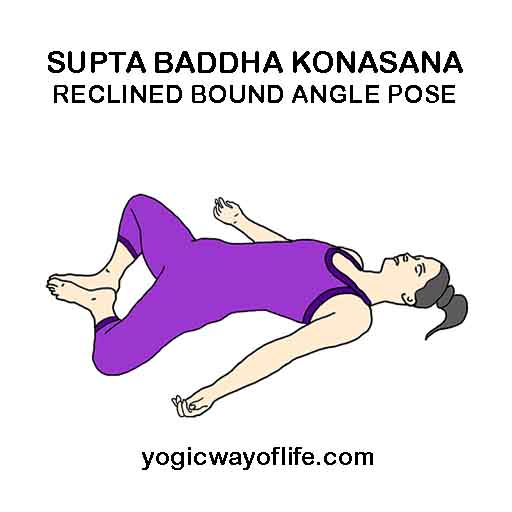Supta Baddha Konasana or the Bound Angle Reclined Pose can be used as a relaxation pose as well as a hip opener. In Sanskrit, Supta means lying down, Baddha means Bound, Kona means an Angle and Asana means a Pose.
How to do Supta Baddha Konasana (Bound Angle Reclined Pose)?
- Start by sitting on the floor with legs stretched out in front of you.
- Fold the knees and bring the two feet together, the soles of the feet facing each other. Hold both the ankles with your hands and pull the two feet inwards so that they touch each other.
- Pull the feet towards the body to the extent it is comfortable.
- From this position, lean backwards and bring your hands back, using your elbows to support the weight of the trunk.
- Slowly bring yourself down on to the floor with your back and head fully resting on the floor.
- The knees can touch the floor if your legs and hips are flexible. But for most beginners, the knees will remain raised above the ground, which is fine. Over a period of time, when the hip joints loosen up, the knees can touch the floor. But do not strain or force it.
- The hands can be kept on the floor at an angle, away from the body with palms facing upwards. The hands may also rest on the belly with palms facing down, if you find it more comfortable.
- Close your eyes. Breathe normally, slowly and deeply in this final position. Observe the breathing process, especially the up and down motion of the abdomen. Remain in this position for as long as you are comfortable. Feel the deep relaxation of the abdomen and the chest region. Feel that your hip joints are loosening up. Relax the neck and the head. Feel the complete rest that the body is experiencing. Enjoy the inner peace.
- To release the position, raise the knees to the upright position, the soles of the feet touching the floor. Turn to any one side. Use your hands to raise yourself up to the sitting position.
Benefits of Supta Baddha Konasana (Bound Angle Reclined Pose)
- Supta Baddha Konasana stimulates the organs in the abdomen like kidneys, ovaries, prostate gland, intestines and the urinary bladder.
- It stretches the muscles of the inner thighs, groins and hips. It can make the hip and groins more flexible.
- It relaxes the body and mind and is good for mild depression.
- It stimulates the heart and improves circulation.
Those suffering from any hip, groin or knee injury should avoid this pose. Also those who have lower back pain should be careful while doing this pose. Pregnant women should do this only under the supervision of a yoga instructor.

